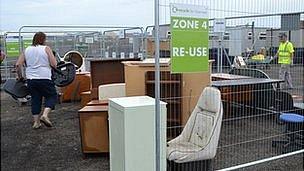Guernsey States introduces more plastic recycling
- Published

The items dropped at Longue Hougue will either be reused locally or exported to be recycled
Guernsey's recycling centre has started accepting 'rigid plastics', which includes buckets, children's toys and garden furniture.
Unlike household plastics, which can be recycled through the bring banks, these do not always have a number to indicate the type of material.
Public Services Deputy Minister Scott Ogier said the scheme was being introduced on a trial basis.
He said if successful it would help the island reach its 70% recycling target.
Deputy Ogier said: "Rigid plastics are often bulky items, so this will have a double benefit of increasing recycling and saving significant space at Mont Cuet. It will also hopefully enable more reuse."
Good quality items left at the recycling site at Longue Hougue will be put aside for other islanders to collect, while anything broken or damaged will go into a recycling skip.
The plastic will then be shredded locally and sent to a UK reprocessor where it will be washed, cut up into smaller flakes and melted down ready for manufacture into new products.
'Contamination'
Tina Norman-Ross, recycling officer, said the department hoped the new initiative would also reduce contamination of the plastic collected at the bring bank sites.
The only plastic objects that can not now be recycled are heavily contaminated items, such as paint pots and plastic products, such as carrier bags, coal sacks, and clear material used to seal food containers.
Mrs Norman-Ross said such items should not be put in bring banks as they can prevent other more valuable plastics being recycled.
She said: "We all want to recycle as much as possible but the market for recycled plastics is for specific types, and in particular high quality material.
"We see a lot of items going into the bring banks that should not be there. We often get carrier bags and coal sacks, but occasionally items such as pool covers, toilet seats and drain pipes.
"This contamination can affect the price a processor will pay, and could even mean a whole batch being rejected by the processing plant and not recycled. Obviously we want to avoid that."
- Published7 September 2012
- Published5 September 2012
- Published27 August 2012
- Published25 June 2012
- Published19 June 2012